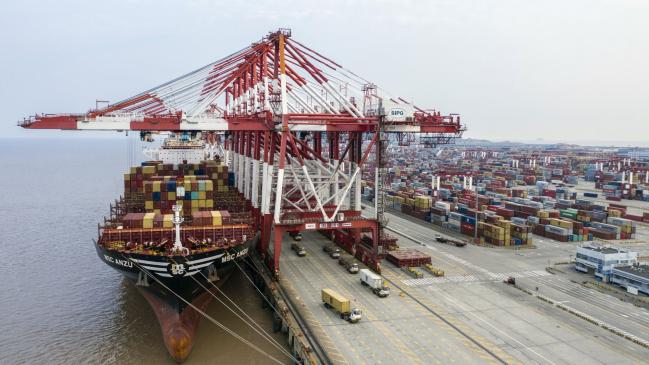(Bloomberg) -- The U.S. and China are discussing arrangements for the meeting between Donald Trump and Xi Jinping on the sidelines of the Group of 20 summit, a senior Chinese trade official said, as Beijing warned about consequences of American trade measures.
The trade teams were working to implement the decision by the top leaders, Vice Commerce Minster Wang Shouwen told a news briefing Monday in Beijing. Wang provided no specifics on what communications have occurred. “Compromise will be on both sides. It will be a two-way street,” he said, adding that any talks must be based on mutual respect, meaning “respect for each other’s sovereignty.”
The face-to-face meeting between the leaders of the world’s two largest economies will be closely watched, as markets anticipate an effort to cool mounting trade and security disputes. Talks broke down last month after Trump accused China of reneging on its commitments, increased tariffs on $200 billion of Chinese imports and threatened to target the remaining $300 billion with duties of as much as 25%.
Although the U.S. has taken steps to ease tensions in recent days, postponing a planned speech by Vice President Mike Pence on Chinese human rights, mounting strategic disputes have tempered expectations for a trade break through. The China Daily, a state-run English-language newspaper, said in an editorial Sunday that “for such a meeting at such a point, course-setting is probably more important than any specifics.”
Trump and Xi planned to discuss a range of shared issues in Japan, Assistant Minister of Foreign Affairs Zhang Jun told the briefing on Xi’s G-20 plans. Chinese officials also called on the U.S. on Monday to roll back restrictions on Huawei Technologies Co. and other technology firms and refrain from weighing in on the recent unrest in Hong Kong.
Wang, the commerce ministry official, argued that blocking Chinese companies including Huawei from buying U.S. software and components also harms the interests of American firms and restricting exports doesn’t help to balance trade. China hoped the U.S. would remove its companies from the entities list, Wang said.
Meanwhile, China’s foreign ministry said at a separate briefing that the Memphis, Tennessee-based FedEx Corp (NYSE:FDX). needed to better explain its errors with packages related to Huawei. In the latest case, the shipping company has said it made a mistake last week by rejecting a shipment sending one of the Chinese company’s phones to the U.S. from the U.K.
“The U.S. government has been trumping up charges to abuse national security and employing state power to clamp down on a Chinese company,” Foreign Ministry spokesman Geng Shuang said in response to a question on the incident at a regular news briefing Monday in Beijing. “That is the root cause of the problem. U.S. bullying has hurt Chinese companies and U.S. companies. It affects normal operations of businesses and disrupts normal cooperation.”
Another sticking point could be Hong Kong, where historic protests against a Beijing-backed extradition bill have prompted U.S. legislation to revisit the former British colony’s special trading status. Activists have announced a “G-20 Free Hong Kong rally” on Wednesday in an attempt to put the issue on the summit’s agenda.
“Hong Kong affairs are purely the internal affairs of China,” said Zhang, the foreign ministry official. “We do not allow any country or any individual to interfere in China’s internal affairs in any way.”
To contact Bloomberg News staff for this story: Peter Martin in Beijing at pmartin138@bloomberg.net
To contact the editors responsible for this story: Brendan Scott at bscott66@bloomberg.net, Sharon Chen
©2019 Bloomberg L.P.
